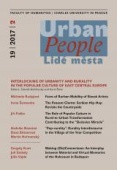The Peasant Ghetto
Serbian Hip-Hop Revisits the Countryside
DOI:
https://doi.org/10.14712/12128112.3320Klíčová slova:
hip-hop, Serbia, ghetto, urban-rural divide, turbo-folkAbstrakt
This paper traces the development of the Serbian hip-hop scene in its ever-changing social context from the late socialist 1980s, through the wartime 1990s, to the transitional 2000s, focusing on local conceptualizations of the notion of the ghetto and different ways in which hip-hop reflects the rural-urban divide in Serbian society. From rapping in rural dialects to satirically praising narco-agriculture, Serbian rappers have made quite a unique contribution to the hip-hop “Internationale” as a global movement with distinct origins in the New York City neighborhood of the South Bronx. Their concept of the peasant ghetto (seljački geto) i s, a t the same time, a form of social commentary on the state of the rural communities in the country and a diagnosis of present-day Serbia as a closed society with a legacy of international isolation following the Yugoslav wars and a peripheral and deprivileged position in the modern global world order. On the other hand, the substantial interactions and mutual influences between the Serbian hip-hop and turbo-folk scenes emphasized in this paper are another indication of the problematic distinction between urban and rural in the Serbian cultural context, at least in the realm of entertainment and popular music. The relationship between these two genres becomes even more interesting if hip-hop is observed as a distinct cultural foreign import with an indisputable urban background and turbo-folk is understood as the sole home-grown form of popular music in Serbia with now-remote rural origins.
Stahování
Publikováno
Jak citovat
Číslo
Sekce
Licence

Tato práce je licencována pod Mezinárodní licencí Creative Commons Attribution-NonCommercial-NoDerivatives 4.0.


